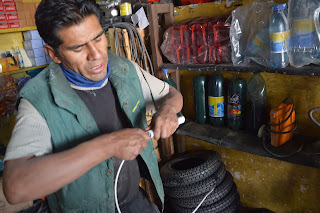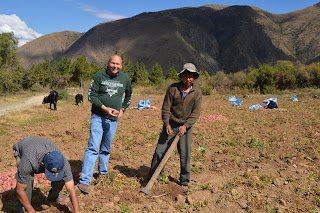BOLIVIAN LIFE
Bolivian high-end Laundromat (These lucky people get warm water exiting from the hot spring pool above where a couple of hundred others are soaking)
Jack and I had to get a new window. Bolivia doesn't have anything close to one stop shopping. They have two blocks that are just paint, but I will save that for another time. So we had to find a Vidrieria. We were driving down the street and saw this:
So of course, we had to stop ...thinking we would get a better price because they were members. Normally when people see our badges they start talking to us and tell us their cousin in LDS or what ward they are in, but this guy didn't say anything. After we ordered the glass Jack asked him about the name. He said it was just an acronym for Mo (something in Quechua) Ro (something in Quechua) Ni (something in Quechua) Who uses Moroni as an acronym? Jack told him that was the name of the angel on top of the temple and a little bit about him. The guy said he had always wanted to know more about that angel. We gave his business card to the missionaries. That will teach him to use an acronym like that without knowing the significance!
Prior to running on to Vidrieria Moroni we found this tile place. They have really special tile here. These samples are tile that is made to look like linoleum:
Who knew we had it all wrong in the US, trying to make our linoleum look like tile?
We have talked about LaCancha, the largest Mercado in South America. We are there at least 3 times a week or more and it is a never ending source of entertainment. I didn't have a wide enough angled lens to really capture the magnitude of the shoe section:
Unfortunately the focus as you can see is on quantity, not quality.
Bolivia never got the memo 40 years ago about underground wiring, and apparently it is too late now. Everyone of their electric poles looks like this or worse. We saw some lineman one day trying to trace down wires. I have been meaning to check into the mortality rate of Bolivian linemen. We arrived at church Sunday and Jack forgot that he was supposed to play the
piano electronic keyboard for Sacrament meeting. Jack's prayers were answered when we found there was no power in the building. The leaders nonchalantly stated that no one had paid the power bill so the power was cut. Just before Sacrament started the lights came on. The branch presidency had shimmied the pole and hotwired the power bypassing the meter.
We have had a really good week, despite the fact that Thursday morning we got a call from Pres. Dyer that the North American missionaries were supposed to be off of the streets by noon because the Bolivian president Evo Morales was in town and mad at the US because he thought they had influenced Europe to not let his plane land when it was suspected that Edward Snowden was aboard. Morales called a conference of the presidents of Argentina, Uruguay, Ecuador, Venezuela and Suriname to denounce the US. Everyone was afraid there would be problems in the streets. We were out in the morning and stopped by the phone store to pick up my phone and this is what we saw across the street

Their meeting was at this hotel just a few blocks from the mission office. We went home, but later that evening we got a call from the office that some new missionaries had arrived and needed beds. We had never been to their area so they told us to meet them at a rotunda near the airport. All along the way there were roadblocks and military everywhere. We were diverted and had to go into the airport to turn around and saw all of the president's planes parked. Top from right to left Venezuela, Ecuador, and Uruguay. Bottom plane is Argentina with Bolivia behind.
We heard there were some demonstrations around the consulate, but other than that we didn't see anything.
We have been working with a couple in our Bella Vista branch that are planning on going to the temple, Susana and Dario. They invited us to go on an outing to Liriuni hot springs above their home. They had been telling us about this paradise in the mountains where the waters colors ranged from turquoise to red with many varying temperatures. Dario had to work, but Susana took us and it was very interesting and scenic. Susana worked in the kitchen at Liriuni as a young girl after her father died to support the family and was baptized in one of the hot pools. She spoke of walking down the mountain every few weeks to meet her mother. That in the olden days it was much different. (She worked there the same years Jack was in Bolivia in the 70's) She had a good time reminiscing and showing us around. The mountains were beautiful, Bella Vista is a flower producing area, and the country side is beautiful. We were just expecting the hot springs to be a bit more pristine. Green Canyon is far more developed as a resort.

There were a lot of people here the day we were there because the first two weeks in July school is out as it is their winter break. The temple sees a huge influx of people during this time as well.
Like a good percentage of the older women in our branch, Susana dresses in the traditional Cholita dress, with full skirts, vests and shawls. You can tell the area the Cholita is from by the type of hat she wears. La Paz has derbys, but most of the Cholitas in the Cochabamba area wear white straw hats. In the last 25 years Cholita pride has come about. Their clothes are very clean, and on special occasions ornate, and many young nice looking women dress this way.
The hot pool water is discharged through pvc pipes into these rocks. This family is doing their laundry in the discharge because it is warm. Susana knew these people and they let us take their picture. Almost anywhere you find water running, you will find women doing all of their laundry by hand, this includes blankets, bedding, everything. Then they spread it out on rocks or bushes to dry. I will never again in my life complain about doing laundry with a washer and dryer.
We took the road above the hot springs up and over the hill into Cochabamba. Along the way we ran into some more friends of Susana's. They were harvesting potatoes!
with picks and shovels. And they had sandals on.
In the background, women and children are sitting in the field sorting. They bag the potatoes in the blue bags and put them by the road for a truck to pick up to go straight to the outdoor market. Jack didn't even try to explain the kind of potato farming we used to do. I don't think they would have been able to comprehend such a chaotic thing! He just told them he used to do the exact same thing. As soon as they finish harvesting a field, they turn the cows loose to clean up the remaining plant leaves and fertilize. It was hard to see, but this field was on a steep hillside. All along the way there were unbelievable views of the valley. We enjoyed our afternoon with Susana and think the world of her and Dario.

The rest of our week has been spent delivering fridges to missionaries that have been waiting for over two months for them to arrive. They were pretty happy to see them. We are also helping get things to set up kiosks in the Saturday neighborhood markets so the missionaries can meet with people and get some more exposure. We have spent a week and a half looking for easy up awnings. If they had Sam's Club, Costco or Wal-Mart here, it would sure make our job a lot easier! Once every 3 months the regular missionaries that are near Cochabamba can attend the temple. We went with them last Tuesday.
This is about half the missionaries in the mission
That's it for this week. Next week we travel back to Sucre and Potosi.































































